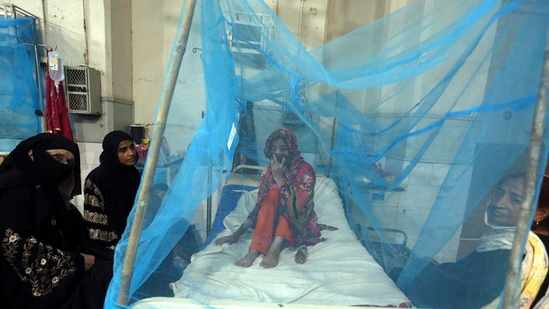The city of Turbat in Kech district of Pak-occupied-Balochistan is currently grappling with a severe health crisis due to a devastating outbreak of dengue fever. This outbreak has claimed over 14 lives, deeply impacting the entire community. The situation remains dire, exacerbated by inadequate healthcare facilities and a lack of essential resources.
Dengue fever, a mosquito-borne viral illness, presents with flu-like symptoms including high fever, severe headache, nausea, vomiting, and body aches. In severe cases, it can lead to severe bleeding, organ failure, and death. The disease is transmitted by the Aedes mosquito, which breeds in stagnant water and bites during the day.
Turbat, the second-largest city in Pak-occupied-Balochistan with a population of over 500,000, is experiencing a significant surge in dengue cases. In adequate hospitals are overwhelmed, and sadly patients are being treated under trees and on the ground due to a shortage of beds.
Every second house has two to three dengue patients. The primary healthcare facilities, both public and private, lack adequate medical resources and diagnostic capabilities. Consequently, over 50% of patients are forced to travel to Karachi for treatment, which is approximately 690 kilometers away and a 10-hour journey fraught with challenges.
Accurate data on dengue-related deaths is challenging to obtain due to the vast and dispersed population of Kech District. Although 14 deaths have been reported, they are not reflected in the official records of the district health department. Dr. Ababgar Baloch, the District Health Officer (DHO) of Kech, said that no deaths have occurred during treatment in Turbat, attributing the fatalities to cases treated in Karachi or those who died while traveling there.
Dengue Fever
The individuals who have succumbed to dengue include Karam Dad, Nako Murad, Akram Ghulam, Bachi Abdul Hakeem, Wali, Jalil Noor, Sabzal, Meherdil, Alla Dad, Noor Khatoon, Lal Baksh, Sikandar, and Kaboos.
Efforts to combat the outbreak include fumigation drives, awareness campaigns, and the distribution of mosquito repellents. However, these measures have not been sufficient to control the virus. The lack of a health emergency declaration in Turbat and overall Pak-occupied-Balochistan shows the urgent need for better medical facilities. The situation is further aggravated by extreme summer temperatures approaching 50 degrees Celsius, combined with inadequate electricity and clean drinking water, which are essential for patient recovery.
The dengue outbreak tragically highlights the systemic neglect and oppression of the Baloch population by the Pak establishment. Despite exploiting Pak-occupied-Balochistan’s vast resources, they have failed to provide even basic healthcare infrastructure, leading to over 14 preventable deaths. This disregard for Baloch lives is unacceptable.
The Pak Army has suppressed the rights of the Baloch while doing nothing for the region’s development or health sector. The global community must intervene to ensure the Baloch have access to adequate healthcare – a fundamental human right being violated.

